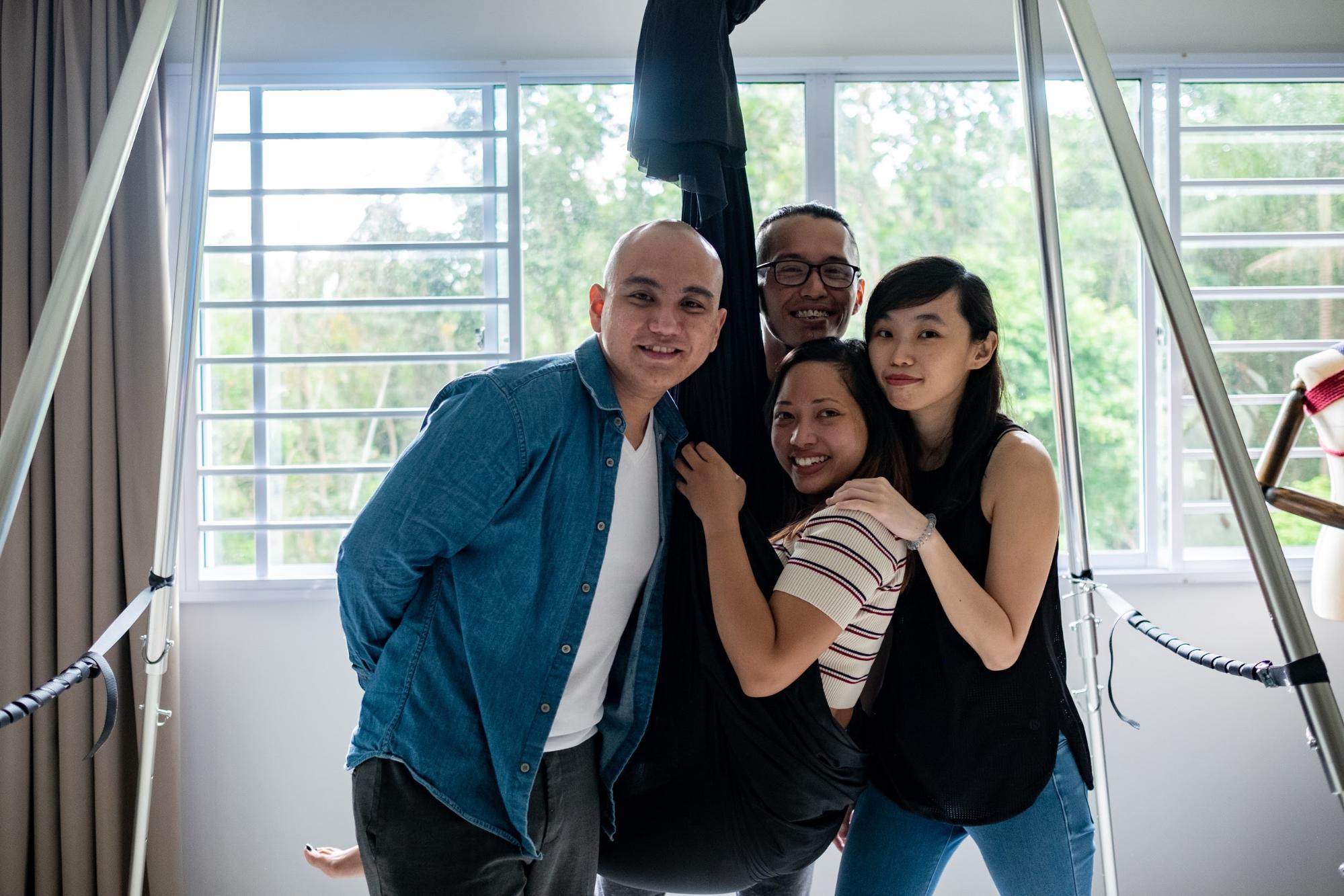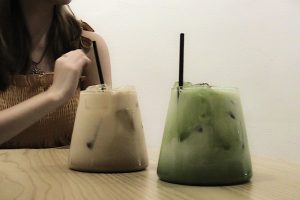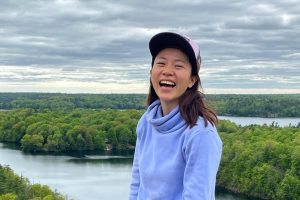Photography by Liang Jin Tey / RICE Media.
Gabe and Elle first met through a dating app. They watched Jumanji on their first date, and it just so happened that they had the same lifestyle philosophy about open relationships.
For both of them, the scripted Singapore relationship is far from appealing: getting married by 25, BTO by 30, then having kids and a traditional family structure. To them, this arrangement prohibits connecting with and loving other human beings outside their relationship. They both feel that there are so many interesting people in this world, and it is possible to build deep intimacy with more than one person.
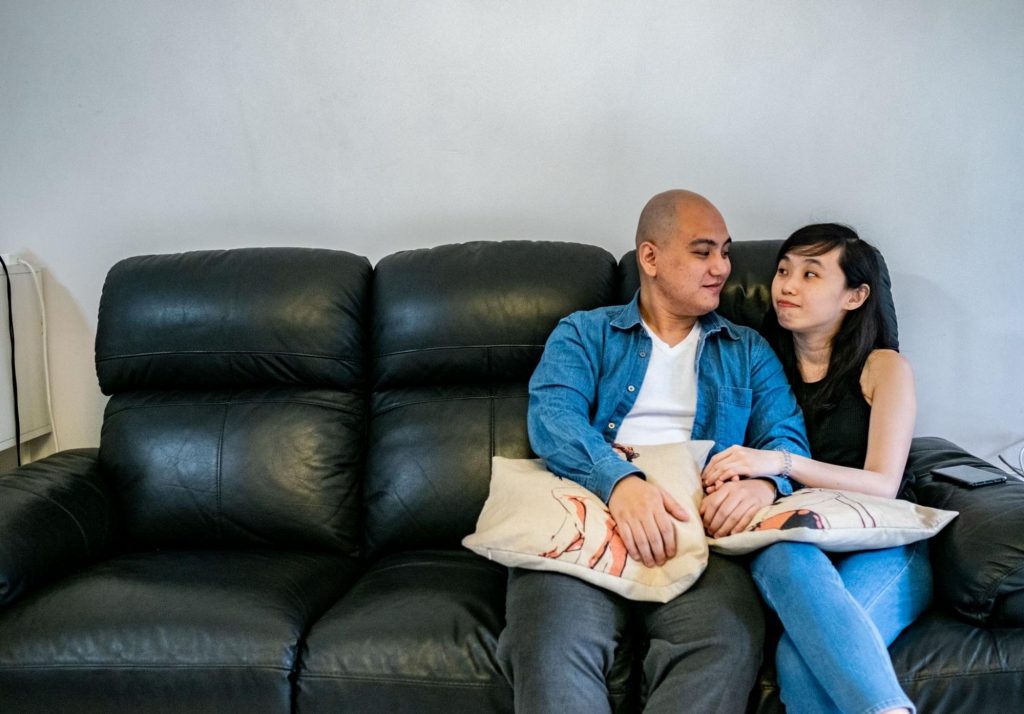
Gabe is a man of many interests and passions. While he holds a full-time job, he is also an avid practitioner of sensual massage therapy on the side, and works with both women and men. This is how he first got acquainted with the polyamorous lifestyle. Meanwhile Elle, a freelance designer, has pursued her own fair share of research, and exploration into this lifestyle, out of her own interest and curiosity. The two quickly connected over the same vision of how a relationship should be.
“We are both solo polyamorists who get along so well, and decide to cohabit together without marriage,” Elle said. “Our primary partners are ourselves, we are two complete individuals who choose to take care of each other. In this sense we get to date other people and have sex with other people outside of our relationship, but this does not diminish the strength in our relationship in any way.
“If anything, this arrangement is a testament to how strong our bond is, because we choose to stay together out of our conscious will and love as a daily choice, not because we have to follow through till ‘death do us part’.”
Just last year, the couple decided to move in together in the middle of the pandemic to an HDB flat in the heartlands. But before you think that this was a typical move-in arrangement, here’s the caveat: they moved in together with another couple—Art and Dee—who practices a dominant-submissive relationship, making the household essentially a quadruple “polyamorous commune” of sort.
They’ve come to call the space “The 360 Experience.” It is not only a co-living space, but also a space to host “holistic” sexual education related events, collaborating with other polyamorous advocates and practitioners in their communities.
‘360’ (degree) refers to an all-rounded education, true to their mission to cover every aspect of growth in self-discovery, sex, love, and intimacy. Elle explained: “A lot of sex education platform and courses in Singapore are usually limited to abstinence and negative consequences. People don’t find them relevant or informative at all. We are teaching through different means and sensorial experiences, using tools, props, and practical workshops. We are creative and versatile. We want to provide a multidisciplinary sex education that is inclusive, honest, complete, real and available for everyone.”
The second couple in the household, Art and Dee also met through a dating app.
Dee, who works in the healthcare industry, came from a very traditional Muslim family. Before meeting Art, she was previously engaged in a toxic relationship where her fiancé would control her behaviour, refusing to let her be herself.
“It was a toxic relationship but I did not realise how bad it was. I was not myself, I was being shamed for having desires and inclination to do many things. When I finally met Art, it felt like a breath of fresh air. He did not judge me—he encouraged and supported all of my explorations, my needs, and my desires. I felt heard and nourished.”
Art, a bartender-turned-food delivery rider, came from two prior failed marriages, so he understands how a lot of couples in Singapore are trapped in toxic marriages or relationships where they are unable to grow or to be themselves.
“It is so easy to lose sight of who you are when you feel like you have to conform to a template dictated by society,” he says. “With every failure, I learnt more about myself and that led me to who I am today, someone with crystal-clear clarity on what I need and want from my romantic relationships. Effective, vulnerable, open communication and strong trust are foundational to create a lasting relationship.”
Through their explorations in the polyamory communities and alternative lifestyles, they met Gabe and Elle. The two couples hit it off immediately and became good friends. They’ve gone for staycation trips together, and enjoy each other’s company immensely. Then, in 2017, on a fateful night over drinks, they decided they would move in together in the coming future. They understood that they connected intellectually and emotionally, and share similar relationship values. They also wanted to educate others on how to have better relationships. Hence the idea of The 360 Experience was born.
Even though they live together, the two couples are not romantic and sexual with each other. Art and Dee share a very different polyamorous relationship model than Gabe and Elle. They are exclusive with each other and chose to get married, followed by signing an official dominant-and-submissive contract.
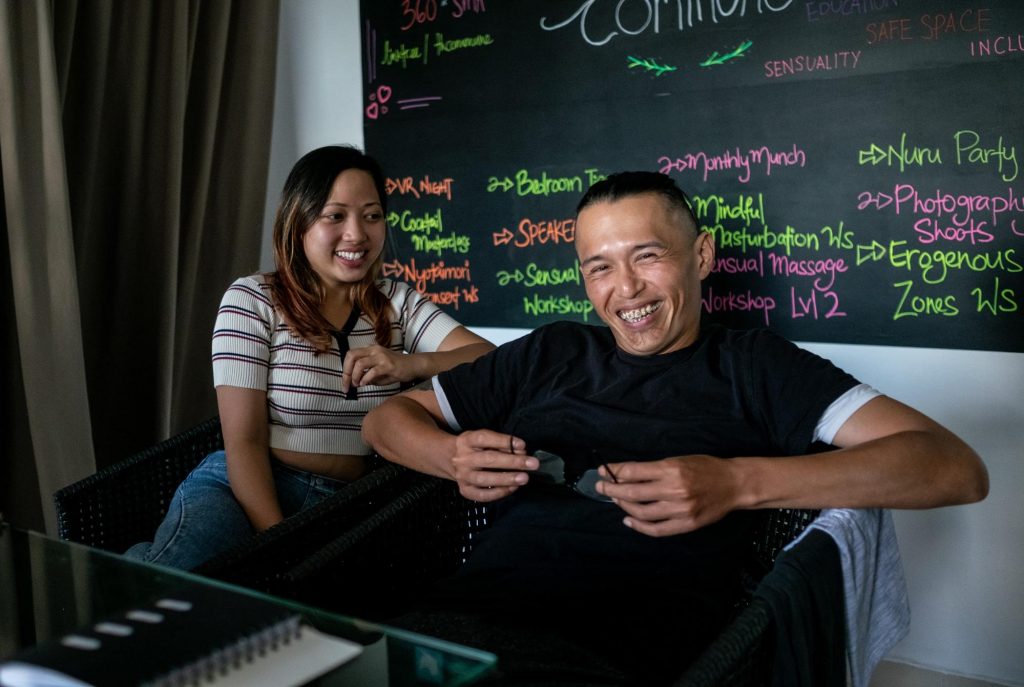
Elle and Gabe were respectively the best woman and the best man, acting as witnesses in the marriage and the signing of the contract. Elle cried buckets during the signing ceremony. “It was such an emotional, touching moment,” Elle recalled.
But how exactly does the dominant-submissive contract work?
It is basically an agreement to establish a communication style and share an exchange of power. Dee defers to Art for most decisions but still retains her autonomy to veto. The dominant, Art, agrees to be responsible for the well being of his submissive, Dee, and has her best interests in all aspects of her life at heart, including everyday routines and even her diet. In addition, Art dictates to Dee how he would like to be taken care of. An example of such instructions would be how exactly Art likes his morning coffee made. On the other hand, Dee shares with Art her goals in self-improvement and self-care, and Art guides her through their shared journeys.
“It is not legally binding though,” Art clarified. “We are always revising the terms of the contract for further improvement, and we can adapt them according to different life stages.
I visited this curious HDB commune for this interview. As far as the layout went, it was a completely normal unit, but with a few little twists.
First came a rather spacious living room that is used to host workshops. On one side stood a big shelf displaying sex toys and relationship card games. On the other side was a headless mannequin body tied up with shibari ropes, next to a curious metal rig from which an aerial yoga hammock hung. A curtain at the corner led to the dining room.
In the dining room, there was a mood board populated with erotic photographs: from boudoir to bondage, from nyotaimori (the art of eating sushi from one’s body) to nuru massage (Japanese erotic body-to-body massage where participants are covered in odorless and colorless massage lotion)—the tastefully taken snaps showed an eclectic range of experimental sensual activities.
“These are just a few of the workshops and activities that we host in this space,” Gabe told me. He pointed to a blackboard mounted on another wall in the dining room. “There on the blackboard is the list of our upcoming workshops. We do not plan too far ahead as we all have full time career and family commitments. We communicate through personal channels, sometimes social media, and host bespoke, tailored events only one at a time. Our offerings are very intimate and catered for small groups.”
I saw all kinds of events and workshops, from the more avant-garde practices such as bondage and nuru to more “vanilla” activities such as “mindful masturbation”, learning about “erogenous zones”, “communicating consent”, and even a “cocktail making masterclass.”
However what really caught my attention was the upper right corner of the blackboard, which spelled out the key values of the commune: connection, openness, communication, inclusive, love, safe space, discovery and awareness, and so on.
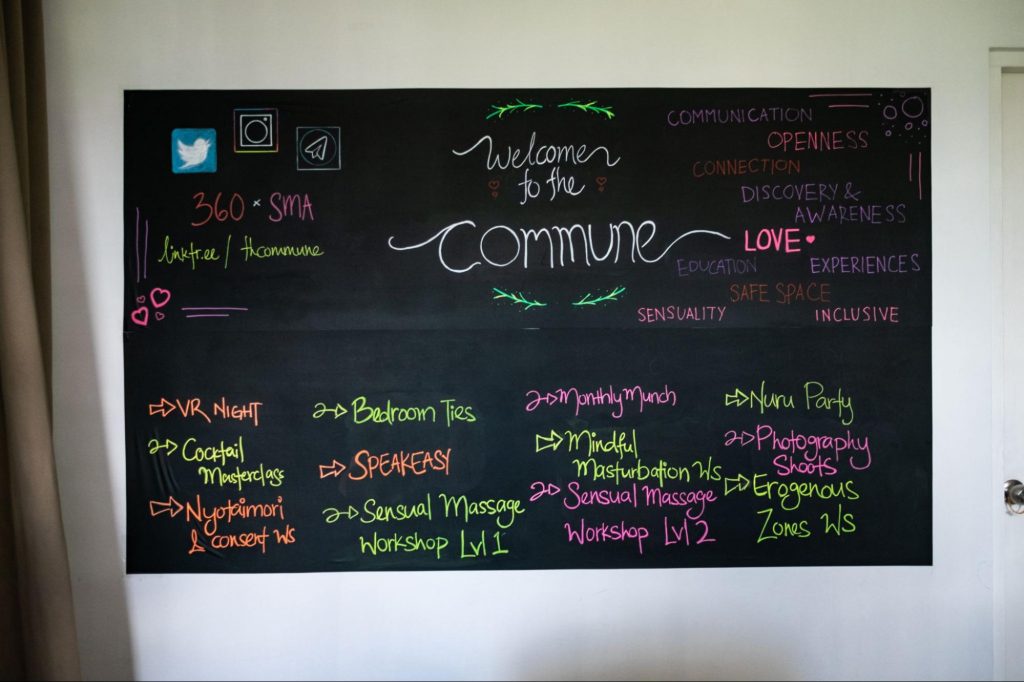
The foursome shares that life inside the commune is a lot of hard work. They come up with a proper schedule for each other to do house chores, cooking, and other logistical operations so that everything runs smoothly and harmoniously. They all live and work together inside the commune, on top of organising events for the public—hence life inside the commune can be very hectic if not properly managed.
“We work hard to create events and workshops that will be useful for the attendees. We have to prepare presentation slides, plan for event flows, and collaborate with the right people in the scene,” said Elle. “We have to make sure that we respect and appreciate each other’s needs and schedule in the commune, and give each other space. We take turns using the living room and we decide on all the events and workshops by consensus.”
They are also very open and accepting of each other’s sexual expressions and desires, regularly inviting friends of their communities to join in or host events. Unlike other groups of roommates who might stigmatise and judge each others’ sexual activities, this is one big way in which they do things differently.
Another thing that they emphasize in the commune is a radically honest, compassionate communication format to discuss everything. They have regular house meetings to check in with each other on any problem that needs to be addressed. Instead of treating each other passive aggressively and letting dissatisfaction fester into resentment, they choose to always have open discussions.
“We call out on each other … lovingly of course,” Gabe added with a chuckle. “Of course we encounter problems like any other group of people living together. Maybe one of us forgets to clear the dishes, maybe one bails on cleaning the house, or hogs the bathroom too long … But we will voice out all these concerns in a neutral, rational, calm, and loving manner. We pride ourselves for striving to have the best communication possible with each other.”
They also frequently schedule group dates and celebrate every milestone in their joint relationships. Group hugs, cuddles, and massages are common in the household.
People outside the polyamory lifestyle might associate all this with debauchery, hedonism, and recklessness, but according to them, polyamory relationships can offer a more structured flexibility and diverse life experiences as compared to traditional relationships. This lifestyle requires a commitment to honesty, ethics and mindfulness to maintain.
The last room in the unit was the “play room”. At first glance, it seemed like a normal bedroom with a queen-sized bed. However, a curtain on one side of the room opened to a big wardrobe filled with all sorts of sex toys, tools, ropes and costumes. Toys and paraphernalia can be cost-prohibitive in Singapore and many find themselves unable to have a firsthand experience at retail outlets or online. The 360 Experience presents an opportunity for singles and couples to explore different things that they may like.
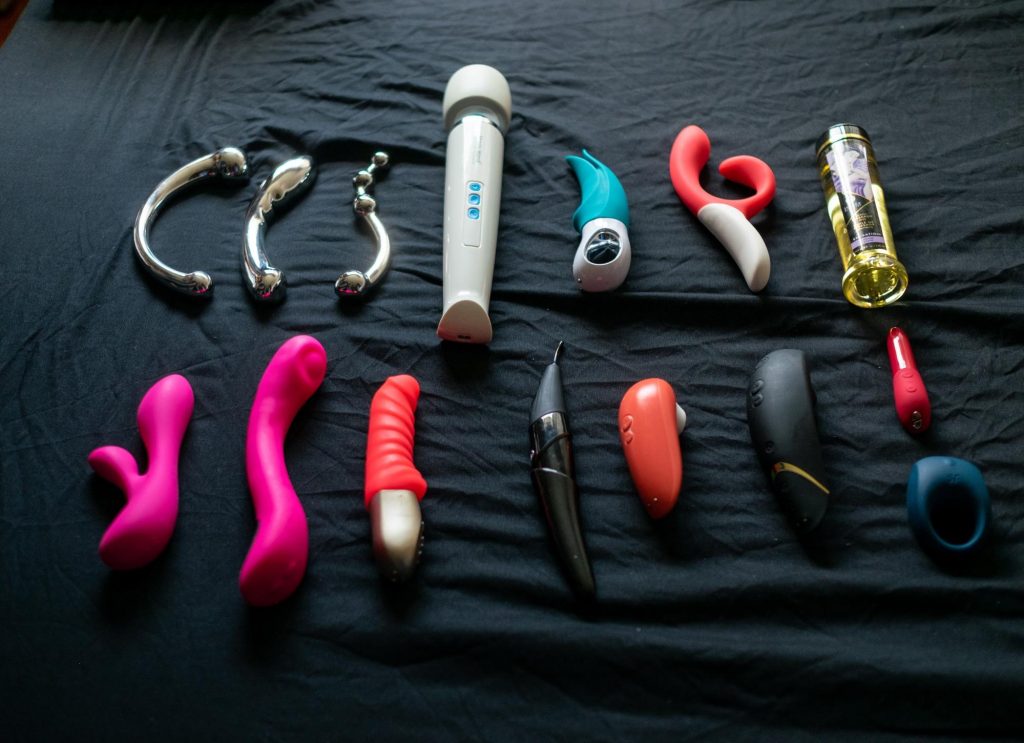
I was genuinely impressed by what I learned from the two couples that day. It sounded to me that spaces like The 360 Experience need to be more common and accessible. We all sorely need access to better education regarding love, sex and intimacy. We want answers, opinions and insights to discuss things that we repress or are deemed taboo, and a non-judgmental safe space to discuss and explore.
It is always a constant challenge for the four of them to keep the space financially sustainable, as they are not marketing or scaling their events for large profits. They consider the commune a non-profit; a passion project. Moving forward, they hope that their network and community members can grow organically and contribute to the longevity of their passion, purpose, and mission.
They are envisioning a fully fledged co-living and educational space in the future, equipped with an F&B space that is open to the public. They hope they can eventually run this space full time.
“Fingers crossed that we will be able to spread our philosophy and help many couples in Singapore become more authentic with themselves and each other,” Dee concluded with a hopeful smile.
The 360 Experience is available on Telegram, Twitter, and Instagram at @th360exp.
Tell us what you thought of this story at community@ricemedia.co.

